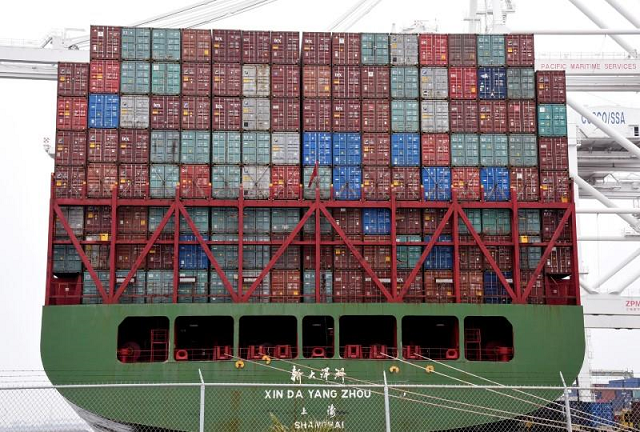Chinese imports to US ports start moving up amid tariff threat
Retailers such as Walmart and Amazon face uncertainty due to US President Donald Trump’s threat to impose more tariffs

Shipping containers being loaded onto Xin Da Yang Zhou ship from Shanghai, China at Pier J at the Port of Long Beach in Long Beach, California, U.S., April 4, 2018. PHOTO: REUTERS
Retailers such as Walmart Inc and Amazon.com face uncertainty due to US President Donald Trump’s threat to impose more tariffs on Chinese goods, and the jump in imports from the country was likely because of “pre-emptive buying in anticipation of the tariffs”, said Ben Hackett, founder of international maritime consultancy Hackett Associates.
China shares drop, yuan lower as US raises tariff stakes
“This is a bump that isn’t quite normal,” he said.
The US container port peak season is traditionally driven by orders for Chinese-made clothing, electronics and toys for the back-to-school season running from June to September, and then the winter holiday season.
The volume of loaded shipping containers from China to all US ports was up 6.3 percent in June from a year earlier after falling 6.9 percent in May and 3.9 percent in April, said Gene Seroka, executive director of the Port of Los Angeles, the busiest US container port and No. 1 hub for ocean trade with China.
Seroka’s data was sourced from IHS Markit’s PIERS and analyzed by Port of Los Angeles staff.
Data about specific products and buyers, which is compiled from paperwork filed when goods are delivered, was not immediately available.
China said on Friday exports unexpectedly accelerated in June. The commerce ministry confirmed that Chinese exporters were front-loading shipments to the United States to get ahead of expected tariffs.
Walmart, Amazon and other retailers declined to comment for this story.
Trump has vowed to reset the United States’ global trade agreements, which includes a threat to impose tariffs on more than $500 billion worth of Chinese goods. Retailers, who place orders for general merchandise up to a year in advance, can offset additional costs by raising prices or finding new suppliers in countries not subject to import levies.
US oil exports to India soar ahead of sanctions on Iran
On July 6, the US imposed 25 percent tariffs on $34 billion of Chinese goods, including flash drives, remote controls and thermostats, from a list of $50 billion in products first proposed in April. China quickly fired back with tariffs on an equal value of US goods, including soybeans, whiskey, cotton and automobiles.
Those are unlikely to immediately affect retailers.
The Trump administration raised the stakes in the trade battle on Tuesday with a plan to add 10 percent tariffs on $200 billion worth of Chinese goods, including furniture, handbags, pet food, refrigerators, textiles and auto parts.
That new round could hit during the autumn lead-up to the all-important Christmas and winter holidays. Many products purchased for that season will have arrived at ports well ahead of the imposition of the new levies.
There are some indications that other industries have employed forward buying to avoid tariffs.
Automakers hailed more ships in May in an apparent scramble to bring vehicles to the United States to pre-empt potential tariff increases. The ports of Baltimore, Jacksonville, Florida; and Brunswick, Georgia - the three leading US ports for importing automobiles - unloaded a combined 23,000 more cars than they did a year earlier, according to port data, port officials and logistics companies.
Trump suggests China might be interfering in US-North Korea talks
Michael Binetti, an analyst at Credit Suisse, said the latest round of proposed tariffs, if implemented, could catch retailers like Restoration Hardware, Williams-Sonoma, Michael Kors and Tapestry in the crosshairs.
In the long run, “I don’t think that the US ports will be any kind of issue,” Binetti said. “The boats will be coming in from Vietnam instead of from China in the same volumes.”



















COMMENTS
Comments are moderated and generally will be posted if they are on-topic and not abusive.
For more information, please see our Comments FAQ